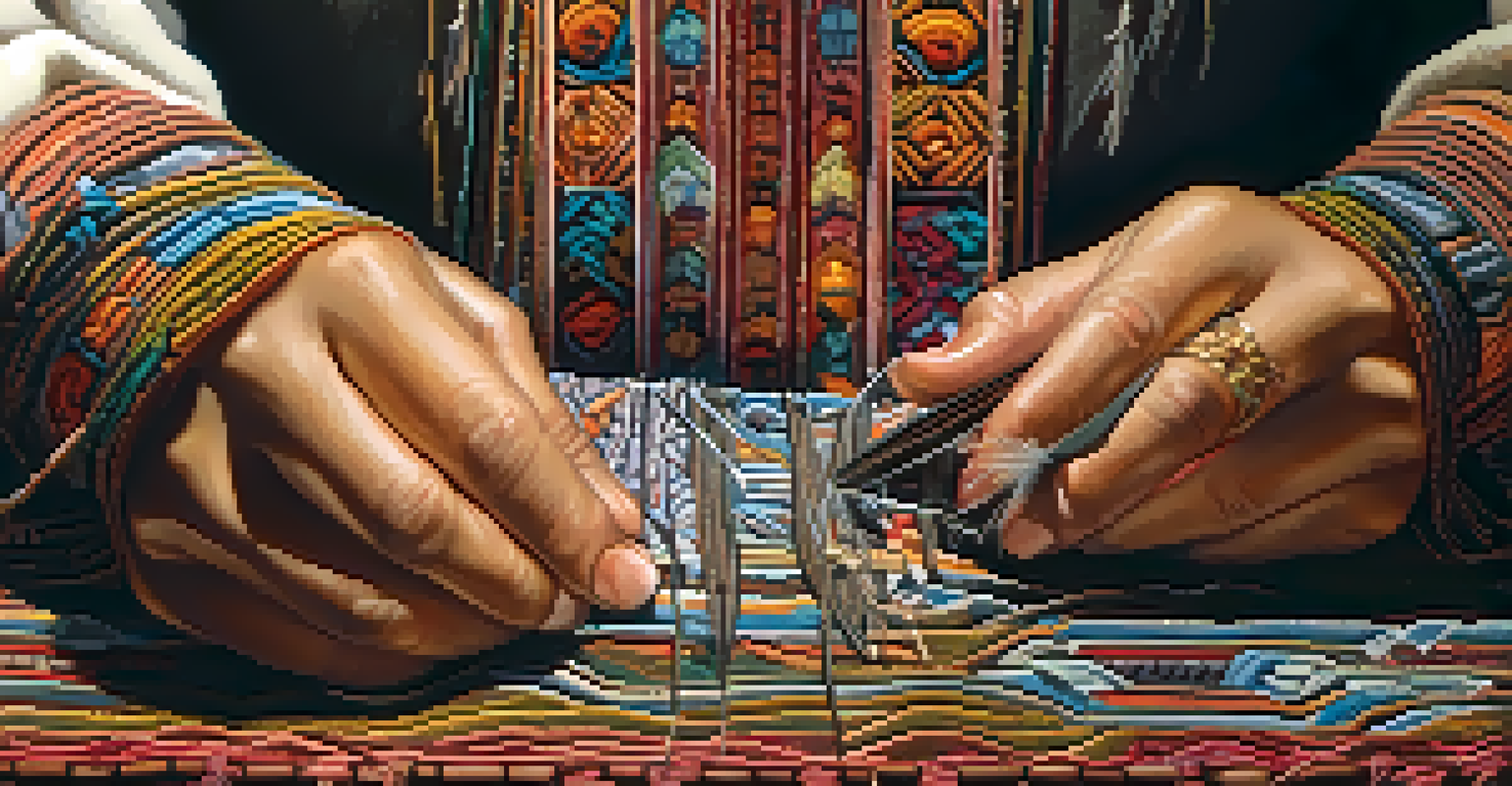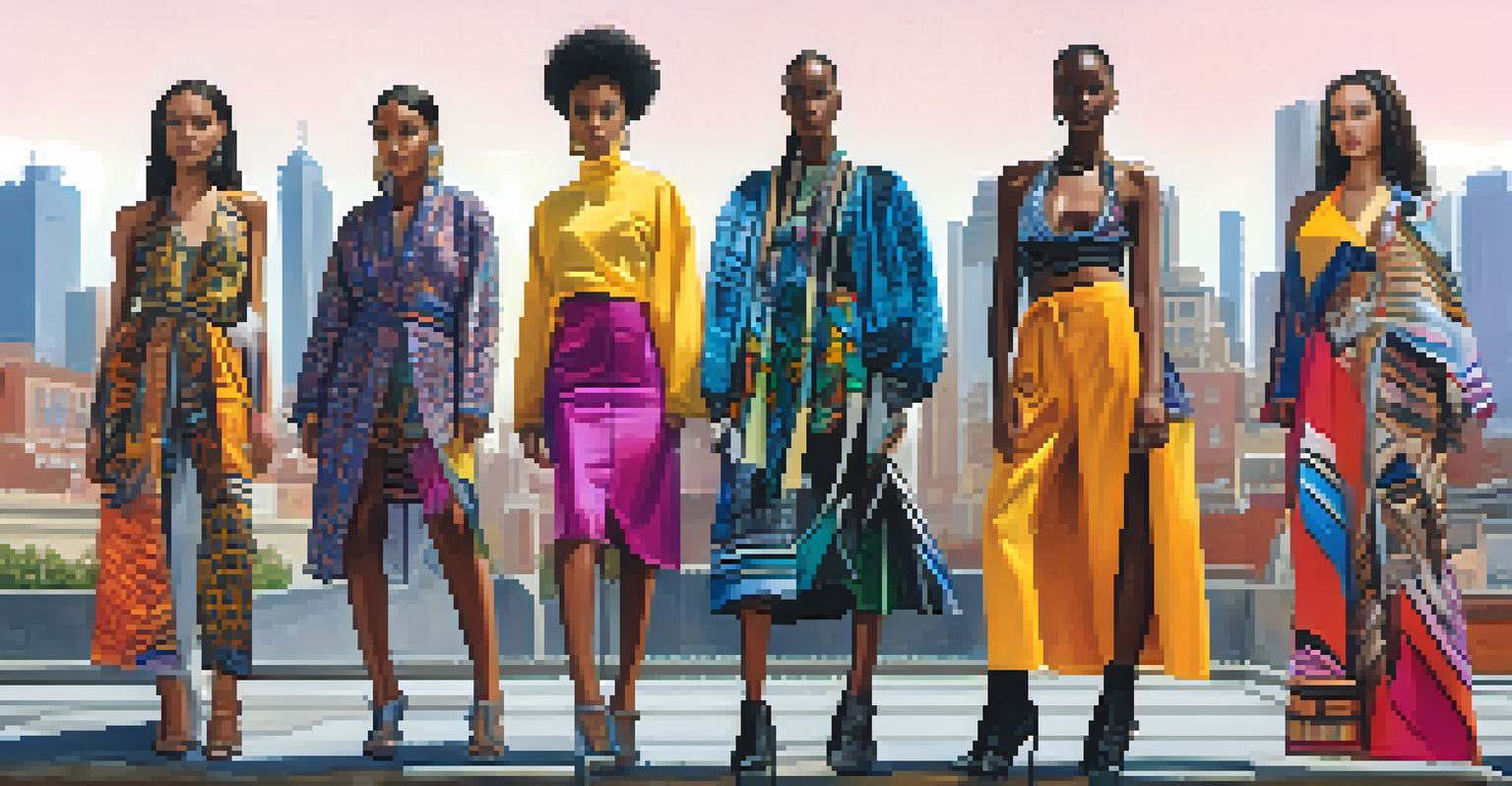The Impact of Cultural Appropriation on Fashion Marketing

Understanding Cultural Appropriation in Fashion
Cultural appropriation occurs when elements of one culture are borrowed by another, often without permission or understanding. In fashion, this can manifest as designers adopting traditional garments or symbols from marginalized cultures. While inspiration can lead to beautiful creations, appropriation often raises ethical concerns.
Cultural appropriation is often about the power dynamics between cultures, and how those dynamics can manifest in the fashion industry.
For instance, when high-end brands use Native American patterns without acknowledging their significance, it can feel disrespectful to the culture that originated them. This lack of respect can lead to a broader conversation about ownership and authenticity in fashion. Understanding this distinction is crucial for brands aiming to navigate cultural influences responsibly.
Ultimately, cultural appropriation in fashion is not just about clothing; it's about respect and recognition. Brands should strive to honor the cultures they draw inspiration from, ensuring that their marketing reflects a genuine appreciation rather than exploitation.
The Fine Line Between Inspiration and Appropriation
Drawing inspiration from diverse cultures can lead to innovative fashion, but it’s essential to tread carefully. Designers often look to different cultures for ideas, which can either enrich their collections or cross into appropriative territory. The key is understanding the context and significance behind the elements being used.

For example, a designer might be inspired by traditional African textiles. However, if they fail to acknowledge the source and instead market it as a 'new trend,' it can undermine the cultural significance. This not only harms the relationship with the community but can also alienate consumers who value authenticity.
Cultural Appropriation Explained
Cultural appropriation in fashion involves borrowing elements from marginalized cultures without proper understanding or respect.
Navigating this fine line requires sensitivity and awareness. Brands should engage with communities, learn their stories, and seek collaboration rather than simply borrowing. This approach not only enriches the fashion narrative but also fosters a sense of unity and respect.
Consumer Awareness and Cultural Sensitivity
Today's consumers are more informed and vocal about cultural issues than ever before. This shift in consumer awareness pushes brands to be more culturally sensitive in their marketing strategies. Shoppers are increasingly scrutinizing brands for their authenticity and respect towards the cultures they reference.
Fashion is a reflection of culture, and it’s vital that we respect the origins of what we wear.
For instance, social media has become a powerful tool for consumers to express their concerns regarding cultural appropriation. A single tweet or post can spark widespread discussions, leading to significant backlash against brands that fail to honor cultural origins. This new landscape means that brands must actively listen to their audience.
Brands that demonstrate cultural sensitivity can build a loyal customer base. By authentically engaging with cultures and recognizing their contributions, companies can create a positive image and foster goodwill among consumers who appreciate their efforts.
Case Studies: Fashion Brands and Cultural Appropriation
Several notable fashion brands have faced backlash for cultural appropriation, serving as cautionary tales for others. For example, a luxury brand once released a collection featuring traditional Asian garments without proper acknowledgment. The result was swift criticism and calls for accountability.
Conversely, some brands have successfully integrated cultural elements by collaborating with community artists and designers. This not only honors the culture but also provides a platform for underrepresented voices in the fashion industry. Such collaborations can lead to innovative designs that resonate with a broader audience.
Importance of Ethical Marketing
Ethical marketing in fashion emphasizes acknowledging cultural origins and stories behind designs to build trust and respect.
These case studies highlight the importance of transparency and respect. By learning from both the missteps and successes of others, fashion brands can navigate the complexities of cultural appropriation more effectively.
The Role of Ethical Marketing in Fashion
Ethical marketing is becoming a crucial aspect of the fashion industry as brands seek to align their messages with cultural respect. This approach involves promoting products in a way that acknowledges their cultural origins and the stories behind them. Brands that embrace ethical marketing can differentiate themselves in a crowded marketplace.
For example, a brand might highlight the artisans behind a collection inspired by traditional craft techniques. By sharing these narratives, they not only inform consumers but also create a sense of connection to the culture. This transparency fosters trust and strengthens the brand's reputation.
Ultimately, ethical marketing is about building relationships—both with consumers and the cultures represented in fashion. It’s a commitment to accountability that can lead to sustainable business practices and a more respectful industry overall.
The Future of Fashion Marketing and Cultural Respect
Looking ahead, the future of fashion marketing will likely be shaped by cultural respect and inclusivity. As consumers demand more transparency, brands will need to adapt their strategies to prioritize cultural integrity. This shift presents an opportunity for fashion to become a platform for celebrating diversity rather than appropriating it.
Innovative marketing strategies may include storytelling that highlights the cultural significance of designs and collaborations with diverse creators. By showcasing the richness of different cultures, brands can create a more inclusive narrative that resonates with a wide audience.
Future Focus on Cultural Respect
The future of fashion marketing will prioritize cultural integrity, transforming the industry into a platform for celebrating diversity.
Ultimately, the future of fashion lies in the balance between inspiration and respect. As brands embrace this ethos, they can contribute to a more equitable industry that honors the voices and traditions of all cultures.
Conclusion: Embracing Diversity in Fashion Marketing
In conclusion, the impact of cultural appropriation on fashion marketing is significant and multifaceted. It challenges brands to be more thoughtful about their inspirations and the messages they convey. By understanding the difference between appropriation and appreciation, fashion can evolve into a more inclusive space.
Embracing diversity not only enhances the creative landscape but also fosters a sense of community and respect. Brands that prioritize cultural sensitivity can build stronger connections with consumers, who are increasingly discerning about the practices of the companies they support.

As we move forward, let us remember that fashion is a powerful medium for storytelling. By honoring the cultures that inspire us, we can create a vibrant industry that celebrates unity in diversity.